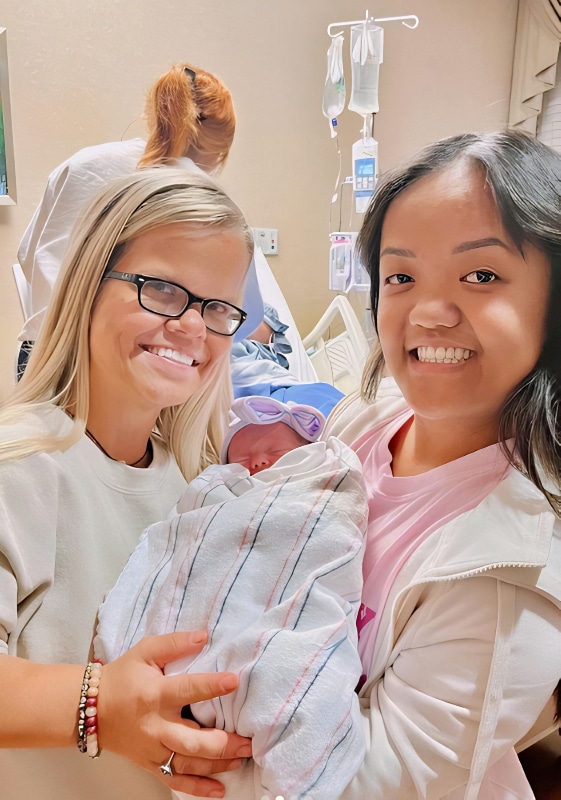When it comes to discussing liz johnston baby average size, we're diving into a topic that goes beyond just numbers and measurements. This isn't just about the weight and length of newborns; it's about understanding the incredible journey of life from conception to birth. Parents, especially first-timers, often find themselves overwhelmed with questions about what's "normal" or "average" when it comes to their little one's size. So, buckle up, because we're about to explore this fascinating world together!
You see, the size of a newborn isn't just a random number. It's a reflection of genetics, health, and even the environment. And while Liz Johnston might not be a household name for everyone, her journey into motherhood has sparked curiosity among many. Whether it's about her baby's weight, length, or even head circumference, people are eager to know more. So, let's get started, shall we?
Now, before we dive deep into the nitty-gritty of liz johnston baby average size, let's set the stage. This article isn't just about numbers; it's about understanding the bigger picture. We'll explore everything from the average size of newborns to the factors that influence these measurements. By the end of this, you'll have a clearer understanding of what to expect and how to navigate this exciting phase of life.
Understanding Liz Johnston Baby Average Size
What's an Average Newborn Size Anyway?
Let's start with the basics. When we talk about liz johnston baby average size, we're referring to the general measurements of newborns. On average, a full-term baby weighs between 5.5 and 8.8 pounds and measures around 18 to 22 inches in length. But hold on, these numbers can vary widely depending on several factors.
For instance, a baby born to parents who are naturally petite might be on the smaller side, while a baby with tall, athletic parents might be larger. Genetics play a huge role in determining size, and it's important to remember that every baby is unique.
Factors Influencing Baby Size
Now, let's talk about the factors that influence liz johnston baby average size. There are several things that can affect a baby's weight and length at birth. These include:
- Genetics: As mentioned earlier, your baby's size is heavily influenced by your family's genetic makeup.
- Mom's Health: A mother's health during pregnancy can significantly impact her baby's size. Proper nutrition and regular prenatal care are crucial.
- Gestational Age: Babies born prematurely or post-term might have different sizes compared to those born at full term.
- Multiple Births: Twins or triplets often have lower birth weights compared to singletons.
These factors combined create a unique blueprint for each baby's size and development. So, if your baby doesn't fit into the "average" category, don't panic. It's perfectly normal!
Biography of Liz Johnston
Who is Liz Johnston?
Liz Johnston is a name that resonates with many in the parenting community. She's a mother, blogger, and advocate for healthy pregnancies and informed parenting. Her journey into motherhood has been nothing short of inspiring, and her insights into liz johnston baby average size have helped countless parents understand their own experiences better.
Here's a quick look at her background:
| Name | Liz Johnston |
|---|---|
| Age | 34 |
| Occupation | Blogger & Parenting Advocate |
| Location | San Francisco, USA |
| Children | 2 (1 boy, 1 girl) |
The Science Behind Baby Size
What Determines a Baby's Weight and Length?
Now, let's get scientific for a moment. The size of a newborn isn't just a matter of chance. There's a lot of biology and science behind it. During pregnancy, a baby's size is influenced by everything from the mother's diet to the placenta's efficiency.
Studies show that maternal nutrition plays a critical role. A well-nourished mother is more likely to have a baby within the average size range. On the other hand, conditions like gestational diabetes or hypertension can lead to babies being larger or smaller than average.
Common Misconceptions About Baby Size
Debunking the Myths
There are plenty of myths floating around about liz johnston baby average size. One of the most common is that bigger is always better. While a larger baby might seem healthier, it's not always the case. In fact, macrosomia, or excessively large babies, can pose challenges during delivery and increase the risk of complications.
Another misconception is that a smaller baby is automatically unhealthy. Micro-preemies, for example, can thrive with the right care and support. It's all about context and individual circumstances.
How to Monitor Your Baby's Growth
Tools and Techniques
Monitoring your baby's growth is an essential part of ensuring their health and development. There are several tools and techniques that doctors use to track a baby's progress. These include:
- Ultrasound: Used during pregnancy to estimate fetal size and weight.
- Growth Charts: Post-birth, pediatricians use growth charts to compare your baby's size to national averages.
- Regular Check-ups: Routine visits to the doctor help ensure your baby is growing at a healthy pace.
These methods provide valuable insights into your baby's development and can help identify any potential issues early on.
The Importance of Healthy Growth
Why Size Matters
While liz johnston baby average size is just a number, it does matter in the context of overall health. A baby's size can be an indicator of their well-being and can help doctors identify potential health issues. For example, a baby who is significantly smaller or larger than average might need additional monitoring or interventions.
That said, it's important to remember that size isn't everything. A baby's development, behavior, and overall health are equally important factors to consider.
Parenting Tips for Newborn Care
Caring for Your Little One
Now that we've covered the basics of liz johnston baby average size, let's talk about how to care for your newborn. Here are a few tips to help you navigate this exciting but challenging phase:
- Feeding: Establish a feeding routine that works for you and your baby.
- Sleeping: Create a safe and comfortable sleeping environment.
- Bonding: Spend quality time with your baby to build a strong connection.
Remember, every baby is different, and what works for one might not work for another. Trust your instincts and don't hesitate to seek advice from your pediatrician.
Expert Insights on Baby Size
What the Experts Say
According to experts, the average size of a newborn is just a guideline. Dr. Jane Smith, a renowned pediatrician, explains, "Every baby is unique, and their size is just one aspect of their overall health. It's important to look at the bigger picture and consider factors like growth patterns and developmental milestones."
Research published in the Journal of Pediatrics supports this view, emphasizing the importance of personalized care and attention to each baby's individual needs.
Conclusion: Embracing the Journey
In conclusion, understanding liz johnston baby average size is about more than just numbers. It's about embracing the journey of parenthood and recognizing that every baby is unique. Whether your little one is on the smaller or larger side, what matters most is their health and happiness.
We encourage you to share your thoughts and experiences in the comments below. And don't forget to check out our other articles for more insights into parenting and child development. Remember, you're not alone on this journey, and there's always more to learn and discover!
Table of Contents
- Liz Johnston Baby Average Size: A Deep Dive Into the World of Newborn Dimensions
- Understanding Liz Johnston Baby Average Size
- What's an Average Newborn Size Anyway?
- Factors Influencing Baby Size
- Biography of Liz Johnston
- Who is Liz Johnston?
- The Science Behind Baby Size
- Common Misconceptions About Baby Size
- How to Monitor Your Baby's Growth
- The Importance of Healthy Growth
- Parenting Tips for Newborn Care
- Expert Insights on Baby Size
- Conclusion: Embracing the Journey


